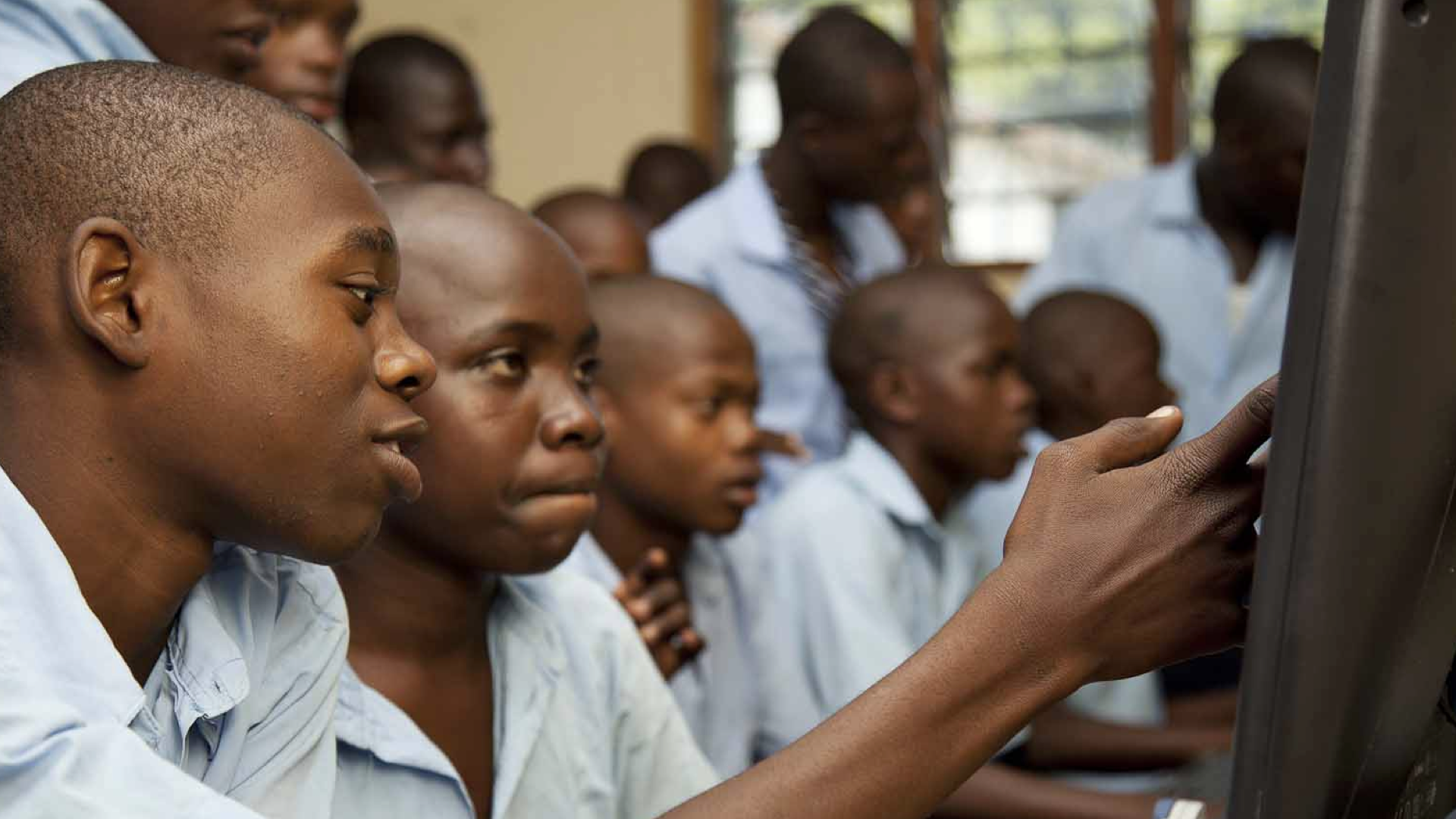
Market & Systems Interventions
Solving through innovation
The complexities presented by the ecosystem require a range of short- and long-term solutions at ecosystem and systemic levels.

Ecosystem support for collective training services are becoming more mature
Founders Factory Africa’s Nicole Dunn expects to see more ‘enabler’ type companies – startups building for startups, further contributing to the ecosystem multiplier effect, e.g. 'Plaid for Africa' ventures (such as Mono and Stitch) and embedded finance offerings (such as Root and OnePipe). She says further that ecosystem infrastructure propositions emerging in verticals, including healthtech (Pneumacare) and agtech (Fieldy), can help catalyse a more robust pipeline of startups outside of FinTech.
A need for on-the-job training: Through placements, internships, or apprenticeships improve meaningful skills connections between young people and industry. High quality apprenticeship opportunities with training or finances increase the ability of small businesses to hire trainees and provide safe, quality experiences.
Technology can be utilised better: Training models that utilise technology for a combination of online and classroom instruction enable scale, reduce cost, and increase the adaptability of curriculum to respond to employer needs. Existing infrastructure, budgets, instructor constraints, combined with the number of young people seeking training, requires models which increase access and reach.
The ecosystem is innovating fast to service clear needs. Briter Bridges, MercyCorps, and the Jobtech Alliance have usefully mapped out the jobtech landscape across Africa as indicated by Figure 48. - 323 active innovators have been identified and categorised across 5 distinct clusters. These jobtech actors will be crucial actors in helping to close productivity and skills gaps, increasing employment opportunities, and bringing formality to informal sectors.
Figure 48: The jobtech landscape. Source: Briter Bridges
Matching platforms, especially open online marketplaces, have significant potential for scaling businesses. Afringa, an online recruitment platform, now has physical offices in Nairobi and Kigali with representatives on the ground in more than 30 African countries. With its next funding round, they will further expand their footprint in West Africa.
Talent networked models, which vet talent against selected projects, will likely see increased growth too. Operators now addressing such gaps include Venture for Africa, which provides talent with a landing pad in the African startup ecosystem, exposing them to local market nuances, and offering expert-led training specific to key roles whilst introducing them to leading startups looking to hire. They offer a 3-month immersion programme and co-create their model with startups. Others, such as Ingressive for Good, which empowers Africans with tech skills through micro scholarships, training and talent placement, recently have secured capital to grow further. Training services across the continent - like Decagon, Semicolon, Moringa School, and professional placement service Gebeya - have all seen huge growth in demand for their services.
HR tech management companies in Africa are improving workforce backend systems, internal operations, and infrastructural issues. SeamlessHR, which helps organisations manage many HR processes on one platform, is an example. From starting out with one product, their suite has now expanded to include a core HR management system, performance and competency management, HR analytics, leave management, payroll management, recruitment management, and other vital modules. Briter Bridges has helpfully mapped out the landscape.

Data pooling and talent hubs for functionality will become increasingly valuable and necessary
Just like investors, some hubs actively contribute to solving the African talent problem. Some have built their own talent-producing and -grooming model through internal training and mentorship programmes. Then, upon graduation, talent is fed back to their startup cohorts, creating a self-sustaining talent acquisition model. A few African hubs have also partnered with universities across the continent to influence curricula and shape what students should study at an early stage, rather than waiting until graduation. Reinforcing and balancing causal loops are essential. The extent to which a systems lens (or dedicated mapping exercise) has been applied is questionable. We have found no evidence of dedicated planning, which would be sensibly advised by key actors, such as the UN’s International Labour Organisation.
Whilst much international attention is (rightly) focused on youth unemployment, this should not come at the expense of focusing on the needs of future employers, including scaling businesses.
Accelerators and hubs should be harvesting significant labour market data. Often these programmes are funded by public or donor funding. Arguably there should be requirements to collect, report, and share relevant labour market data-sets. Yet no such discussion happens within the ecosystems about designing collective intelligence approaches. This is a missed opportunity. The employment arena is rapidly evolving and highly dynamic. Data pooling and analysis is essential - working with the institutions responsible for developing talent in the first place to ensure a greater alignment between supply and demand. Sadly a lack of leadership means these conversations happen in silos, or not at all.

Designing and implementing mental health strategies
“Managing mental health has to start from the donor, the funder. One of the metrics of their return on investment should also be the well-being of the beneficiary.” - interviewee
There has not been sufficient focus on well-being and mental health within the startup and scale-up ecosystems in Africa. Even worse, mental health issues are often stigmatised.
The resilience of an African entrepreneur deserves far greater global recognition and respect - being able to survive (and thrive) in the toughest conditions commands attention. Peers in Europe and the U.S. could (and should) learn from their experiences, but too few channels exist for healthy experience-led knowledge exchange.
As a founder we spoke with explained, “My entire village depends on me succeeding. In Africa, you have to take care of everybody. That's where the resilience comes from.” However, by celebrating high levels of resilience, we detract attention from the corollary impact: the negative effects on mental health. We have seen little evidence of psychosocial support for entrepreneurs in acceleration programmes, despite multiple stakeholders identifying the issue as a priority.
“The thing I keep telling people is that if you're a little bit suicidal, a little bit bipolar, emotionally, physically, spiritually, and destroyed all of your relationships, and gone completely bankrupt: Welcome to your first five seconds of being an entrepreneur. It's not this beautiful, lovely rose-coloured thing.” - interviewee
Leaders not being sufficiently supported can lead to burnout and churn. Research points to the value of a firm caring about their employees’ and colleagues’ wellbeing, and that being a considerate employer is a key part of scaling a sustainable business.
It has been suggested that one legacy of the COVID-19 crisis could be a revolution in how we measure mental health. There are calls to harness data to improve not just our individual mental health but our collective mental health too. Many organisations use wellbeing indicators that measure levels of anxiety and job satisfaction, with pulse surveys and net promoter scores as a measure of engagement. If we had better measures we could use them not just to address negative patterns, but also to promote positive ones – to understand what helps groups to thrive. This has been the message of the ‘positive psychology’ movement and many nations now measure happiness.
According to research, approximately half of (global) entrepreneurs suffer from at least one form of mental health condition during their lifetimes. These include depression, ADHD, bipolar disorder and a host of addictive disorders.
It is rare to hear any debate on this important topic in the Africa ecosystem, let alone any considerations on specific solutions. This is a clear market failure, and where international (donor) funding could be channelled, instead of the usual incubation arena. Marcel Muenster, Founder of the The Gritti Fund, usefully identifies the need for concerted action around the following:
Implementing mental health strategies
-
Destigmatisation:
Investors need to lead by example, by showing founders that it’s okay to be vulnerable and open up about their mental health challenges. The process of openly communicating and showing support for founders can start as early as in the due diligence process. A great way for investors to support this initiative is to take the Investors Pledge developed by Erin Frey and Ti Zhao. It is a public commitment to take an active role in mental health.
-
Wellbeing resources:
The global investment community must change its mindset by expanding its horizon beyond financial and other key performance indicators by also taking into account the mental and physical wellbeing of their most important asset, the founders. Just because a startup has raised $2 million or more doesn’t mean that the Founders have the means to seek support and help. It is the investor’s responsibility to allow founders to spend a fraction of the investment on their personal wellbeing.
-
Investor support:
Investment funds need to include mental health professionals in their organisational ecosystem to serve as support systems and to implement empirically proven, enhancing and curative strategies for the leadership of the human beings who are stewarding their investments.
Access to a range of mental health resources is readily available in mature ecosystems (somewhat ironically, led by smart tech startups). More can be done in Africa, encouraged by sensible incentivisation schemes, co-supported by investment professionals.

Active investors should invest time into talent
A leading investor mentioned to us that, because scarcity of talent is common to everyone on the continent, they become directly involved in trying to find ways to assist and hire local talent. Smart investors dedicate a lot of time on this - from seed to Series B. They do it by making the right connections, leveraging their internal value creation teams, as well as participating in recruitment committees (especially at C-suite level). Whilst such efforts are necessary, they do not increase the underlying shallow pool issue.
As part of their investment strategy, VCs could identify individual and collective strategies to invest more into African talent-producing companies that will accompany the growth rate of their portfolio companies. It will be cheaper for the startups to find talent locally or in neighbouring countries across the continent. Such collective approaches may seem unusual, but syndicating interest around the talent pipeline commons will be valuable, because continuing to perpetuate zero-sum approaches will likely return the same problems.

New ways to certify experience will emerge
Where large informal markets exist, resumes are typically laden with professional experience that is difficult to compare or calibrate.
The scale of alternative credentials – certificates, badges, and microcredentials – has expanded considerably. This is as a consequence of a rising demand for upskilling and reskilling, as well as a sharp reduction in the unit cost of education and training provision made possible by digitalisation. There is unquestionably a need for innovative certifications for specific skills or competencies which can help focus training and respond to market demand so that young people can attain skills required by employers to transition into work more quickly, and develop additional new skills over time.
As a general rule, employers globally do not yet seem to view alternative credentials as substitutes for formal higher education qualifications; rather, they appear to see them as complementing formal qualifications. This may partly be explained by employers’ unfamiliarity with these credentials.
Notwithstanding the challenges they present - such as confusing signals caused by the lack of standardisation and the absence of validation procedures - African scaling ventures might wish to get more familiar with these types of credentials and apply innovative processes to reflect labour market realities. This is all the more necessary given that formal education is often beyond the reach of African entrepreneurs due to the associated high costs.
By way of example, Hotels.ng, an aggregator site, launched HNG internship - an online internship that serves as a digital filtering mechanism which screens candidates without ever meeting them, taking them through multiple round, task-based, impartial recruiting processes. This structured candidate-testing platform considers behaviour modelling and tests for character, aptitude, competence, relationships. Shortlisted candidates then perform simulated work environments activities as part of their assessment.
The certification of specific skills or competencies has the potential to focus training offerings, reduce time spent in training, and respond to market demand so that workers can attain the skills required by employers, transition to work more quickly, and develop additional skills over time.
Building systemic capacity for the long term
The African labour market needs systemic solutions, with partnerships and collaborations aligning to solve collective challenges. In the immediate term, collaboration with local and international technology companies is an opportunity to provide high-quality digital skills training. Training run by technology companies has already had a positive impact; for example, Grow with Google and Andela have trained more than 100,000 professionals in skills ranging from basic graphic design to advanced application development.

Skillup Africa
The Skillup Africa talent fund, structured as an impact investment platform, currently sources from institutional investors, businesses through CSR initiatives, and NGOs through grants. The programme helps young graduates (under 30) who do not have the financial means to pay for tech-focused short- and medium-term training courses. The fund disburses student loans to successful applicants, with loan repayments only commencing three months after the training is completed, providing a buffer for beneficiaries to secure a job. The screening process for applicants (in addition to aptitude tests and in-person interviews) includes background checks, creditworthiness, and completion of loan documentation. The loans are provided at an interest rate of 10 percent per annum, which students pay in advance as a commitment fee.
Future Africa proposes a need for governments to channel more funds towards short course programmes, similar to Refactory in Uganda, that are aimed at training technical talent. Some of this money can also go towards scaling programmes such as the ones being offered by Hotels.ng and TalentQL’s AltSchool Africa. With government funding and investment, these programmes can be expanded to include a period of training for individuals interested in technical skills and the best performers placed in various startups for internships and eventual employment. There is also an opportunity for more universities to pursue affiliate partnerships with companies, fellowships and software companies that offer resources and programmes which in the end result in well-rounded and qualified software engineers.

More context-appropriate initiatives needed that grow the tech talent pipeline
Future Africa also proposes that ecosystem actors should set up a non-profit with a mission to finance initiatives aimed at growing the tech talent pipeline. Bringing together Alt School Africa, Andela, Gebeya and others, it would work with established universities to set up programmes that are aimed at training talent with an evolving curriculum. Annual donations from large technology players would financially sustain it.
Whilst this initial concept has great merit, we recommend deeper early exploration to ensure that the design and implementation model reflect the complex socio-economic context in which such programmes are delivered, and take account of changes in pedagogies (teaching methods) due to Covid. Heutagogy models (in which the curriculum is learner-centred rather than content-centred) are coming to the fore. Gordon Adomdza, Associate Professor at Ashesi University in Ghana acknowledges the need to shift to encourage self-directed learning, while still achieving core teaching goals, with the future of education being hybrid learning. Correspondingly, the next generation need to be ethical and entrepreneurial leaders.
Similarly, initiatives must be future-looking, ensuring that skills required in tomorrow’s workplace are being developed today. In Africa, there is a tendency to focus on learning hard skills, such as coding, with insufficient attention on the soft skills that machines are unable to master, and hence are increasingly in demand as automation disrupts the world of work. According to the World Economic Forum, eight out of ten of the top skills required by 2025 are soft skills, as indicated by Figure 49.
Figure 49: Top 10 skills of 2025 Source: World Economic Forum

Engaging the diaspora to transfer skills and knowledge and share learnings
A recent report by the Tony Blair Global Institute on Africa’s startup sector recommended that governments should launch – either individually or as a bloc – a year-long programme to encourage diaspora to return to the continent. Ethiopia is leading the way with its recent “Diaspora Tech Homecoming'' initiative that hosted more than 400 attendees under the bigger umbrella of the “Great Ethiopian Homecoming” – launched by the country’s Prime Minister. This homecoming is aimed at welcoming the Ethiopian diaspora to participate in a range of conferences across different sectors to foster sustainable and robust engagement.
There are helpful learnings from international bilateral collaborations, such as the French-African Foundation, and there are roles for diplomatic missions to promote labour exchange models alongside more flexible work placement visa models.
Few diaspora are likely to return to their countries of origin full-time, but there are other ways in which they can actively participate and add value. Some of the ways they might do this include:
Investing in the startup ecosystem through angel syndicates and crowdfunding initiatives;
Actively engaging in knowledge exchange through (remote) mentoring, internships and labour exchange programmes; and
Advocacy efforts which can be made at various levels, from diplomatic lobbying through to creating awareness of opportunities within diaspora social media groups.
Governments should ensure that local tax regulations encourage rather than deter such diaspora investment.

Paradox 7: Data shows that ordinary Africans invest in Africa, while the most wealthy - rather too frequently - do not. Redesign investment incentives and pathways, especially encouraging ways in which diaspora channels can be opened further.

Reform and supplement education systems to deliver against the vocational needs of industry
A survey completed some years ago indicated that among colleges and universities in sub-Saharan Africa:
Only a small number (7 percent) have an entrepreneurship centre dedicated to entrepreneurial development;
28 percent offer courses specialising in entrepreneurship; and
10 percent offer a course in innovation and technology.
Limited opportunities for hands-on learning and managing small projects mean that students are not afforded clear paths for cultivating competencies related to practical thinking and creative problem-solving, which are skills needed to successfully build and manage a business. As a result, most Afro-entrepreneurs do not feel adequately trained to manage a new firm, which for many leads to the tendency to look for jobs in well-established firms and corporations.
Local African universities have to work differently to better prepare students for the changing demands of the global workforce. Universities need to rethink their approach to learning if they are to produce people with the critical thinking, leadership, collaboration and problem-solving skills needed by scaling ventures which, by all indications, will provide the crucial employment pathways in the future.
Africa needs to expand its pool of highly-skilled employees through the development of cognitive STEM-based skills, as well as non-cognitive soft skills like sense-making and social intelligence competencies. It will be imperative for employees of the future to demonstrate the skills that machines cannot learn. Non-cognitive, character competencies, as opposed to routine learning and knowledge-based skills, are likely to be the qualities most valued. It will no longer be about “what you know”, but more about “what you do” with that information, through the utilisation of value-based expertise that will enable employees to remain relevant in a more technologically-enabled workforce.
Unfortunately, learning in many African universities still happens in large lecture halls and rewards the ability to remember and repeat information (one of the least effective ways of learning). An IFC/ Google report, e-Conomy 2020, states that 31 percent of African developers are self-taught. Because they “didn’t train in a more structured environment,” these large skills gaps exist, which roots back to the education system not sufficiently preparing developers for the global stage.
Root cause issues begin at the early childhood development stage, and lead into formal school education systems that remain largely based on Victorian models of education designed to provide labour for the first industrial revolution, rather than the fourth. Governments should acknowledge their larger reform roles as part of their transformation agenda, as many are now beginning to do.
Quality education relies on an extensive, interlinked, robust infrastructure and ecosystem. Education ministries and departments across Africa need to better align the demand of businesses with the supply of learner graduates. Universities and colleges should rapidly innovate and adapt, and evolve models. And do this quickly. It is a tragedy that Africa’s youth unemployment rates are so high yet employers cannot find a strong enough pool of sufficiently experienced talent. Several universities are doing pioneering work. But too many remain conservative and slow to adjust.
Creating university systems of the highest quality requires political will and resources, but also research and analysis. While there is an unmistakable ground swell of concern and energy for change around graduate employability (globally as well as in Africa), too often policy and institutional initiatives are hampered by a lack of evidence on which to base decisions.

Education Sub Saharan Africa (ESSA)
Education Sub Saharan Africa (ESSA), a non-profit organisation, proposes sensible recommendations:
Universities, colleges and employers should collaborate to redesign their courses to meet the current needs of the job market.
Universities and colleges should include entrepreneurship training and digital innovation across different courses.
Rather than setting up their own training institutions, employers should work with universities and colleges to strengthen existing programmes to meet employers needs.
Education institutions should invest in creating career guidance and counselling centres to support students, especially the underprivileged.
Universities and Colleges in sub-Saharan Africa should ensure effective engagement between alumni networks and current students, to provide students with expert advice on many issues.
Workers have to want to diversify and expand their skill set. It is no longer enough to be good at just one thing. There has to be an eagerness to learn, grow and execute tech skills that are within reach and in high demand. Employers must also realistically map out what the road to upskilling can and must look like in a rapid and ever-evolving tech climate. This means obtaining the skills and validations, through informal and formal training, that can advance one from junior to intermediate level in 18 months, or intermediate to senior within 2 years.




